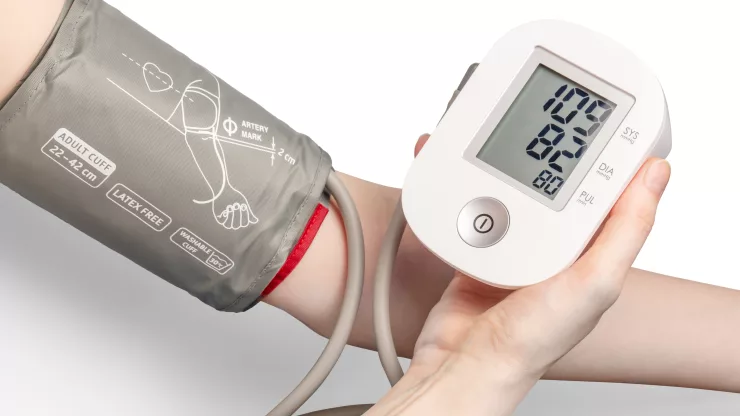High blood pressure, also known as hypertension, is a common condition that affects millions of people worldwide.
While it can often go undetected, high blood pressure can have a significant impact on heart health and can lead to serious health complications if not managed properly.
In this article, we will explore the connection between high blood pressure and heart health, risk factors for high blood pressure and heart disease, diagnosis and treatment options, and steps you can take to prevent high blood pressure and promote heart health.
Jump to Section
Introduction
Heart disease is a leading cause of death worldwide, and high blood pressure is a major risk factor for developing heart disease.
Managing high blood pressure is crucial for maintaining good heart health and preventing heart-related complications.
In this article, we will discuss what high blood pressure is, how it affects the heart, and the importance of managing high blood pressure to promote heart health.
Understanding High Blood Pressure and Its Connection to Heart Health
What is High Blood Pressure?
High blood pressure occurs when the force of blood against the walls of your arteries is consistently too high. This can damage the arteries, making it harder for blood to flow through them and increasing the risk of heart disease.
How Does High Blood Pressure Affect the Heart?
When high blood pressure goes untreated, it can cause damage to the heart over time. The heart has to work harder to pump blood through the body, which can lead to an enlarged heart, heart failure, or a heart attack.
The Importance of Managing High Blood Pressure for Heart Health
Managing high blood pressure is crucial for maintaining good heart health. By keeping your blood pressure under control, you can reduce the risk of developing heart disease and lower the risk of heart-related complications.
Risk Factors for High Blood Pressure and Heart Disease
Age and Gender
As we age, our risk for high blood pressure and heart disease increases. Men are also more likely to develop high blood pressure than women until women reach menopause.
Family History
If you have a family history of high blood pressure or heart disease, you may be at a higher risk of developing these conditions yourself.
Lifestyle Factors
Diet and Nutrition
A diet high in salt, saturated and trans fats, and sugar can increase the risk of high blood pressure and heart disease. Eating a healthy diet rich in fruits, vegetables, whole grains, and lean proteins can help reduce the risk.
Physical Activity
Physical inactivity is a major risk factor for developing high blood pressure and heart disease. Regular exercise can help keep blood pressure under control and promote heart health.
Smoking and Alcohol Consumption
Smoking and excessive alcohol consumption can increase the risk of high blood pressure and heart disease. Quitting smoking and drinking alcohol in moderation can help reduce the risk.
Diagnosis and Treatment of High Blood Pressure and Heart Disease
Symptoms and Testing for High Blood Pressure
High blood pressure often has no symptoms, making it important to have your blood pressure checked regularly. A blood pressure reading of 130/80 or higher is considered high.
Medications for High Blood Pressure
Medications, such as diuretics and ACE inhibitors, can help lower blood pressure and reduce the risk of heart disease. However, it is important to work with your healthcare provider to find the right medication for you.
Lifestyle Changes to Manage High Blood Pressure
In addition to medication, lifestyle changes such as a healthy diet, regular exercise, quitting smoking, and limiting alcohol consumption can help manage high blood pressure and promote heart health.
Surgical Interventions for Heart Health
In some cases, surgical interventions such as angioplasty or bypass surgery may be necessary to treat heart disease and reduce the risk of complications.
The Link Between High Blood Pressure and Other Health Conditions
Diabetes
People with diabetes are at a higher risk of developing high blood pressure. High blood pressure can also increase the risk of complications associated with diabetes.
Kidney Disease
High blood pressure can damage the kidneys and increase the risk of kidney disease.
Stroke
High blood pressure is a major risk factor for stroke. By managing high blood pressure, you can reduce the risk of stroke and other complications.
Table: Relative Risk of Health Complications Associated with High Blood Pressure
| Health Complication | Relative Risk |
|---|---|
| Heart disease | 3x |
| Stroke | 4x |
| Kidney disease | 2x |
| Diabetes complications | 2x |
Preventing High Blood Pressure and Promoting Heart Health
Healthy Eating Habits
Eating a healthy diet rich in fruits, vegetables, whole grains, and lean proteins can help reduce the risk of developing high blood pressure and heart disease.
Exercise and Physical Activity
Regular exercise can help keep blood pressure under control and promote heart health. Aim for at least 30 minutes of moderate exercise most days of the week.
Stress Management
Stress can increase blood pressure, so learning stress management techniques such as meditation or deep breathing can help manage high blood pressure.
Regular Health Screenings
Regular screenings for high blood pressure and heart disease can help identify any potential problems early on and allow for prompt treatment.
Conclusion: Maintaining Good Heart Health
Managing high blood pressure is crucial for maintaining good heart health and preventing heart-related complications. By making healthy lifestyle choices, working with your healthcare provider, and staying up-to-date on health screenings, you can reduce the risk of high blood pressure and promote good heart health.
Future Directions for Research and Education on High Blood Pressure and Heart Health
As we continue to learn more about high blood pressure and its impact on heart health, research and education efforts will continue to play a critical role in improving prevention and treatment options for those at risk.
FAQ
What is the best way to prevent high blood pressure and heart disease?
The best way to prevent high blood pressure and heart disease is to maintain a healthy lifestyle, including a balanced diet, regular exercise, quitting smoking, and limiting alcohol consumption.
What is a healthy blood pressure range?
A healthy blood pressure range is less than 120/80 mmHg.
Can high blood pressure be cured?
While high blood pressure cannot be cured, it can be managed through lifestyle changes and medication.
What are the symptoms of high blood pressure?
High blood pressure often has no symptoms, which is why it is important to have regular blood pressure screenings. In some cases, when blood pressure is very high, symptoms such as headaches, dizziness, or shortness of breath may occur.
How does high blood pressure affect the body?
High blood pressure can damage the arteries, leading to an increased risk of heart disease, stroke, and kidney disease. It can also cause damage to the heart, leading to an enlarged heart, heart failure, or a heart attack.

With a deep passion for personal development, Ben has dedicated his career to inspiring and guiding others on their journey towards self-improvement.
His love for learning and sharing knowledge about personal growth strategies, mindfulness, and goal-setting principles has led him to create My Virtual Life Coach.
Contact Ben at [email protected] for assistance.




